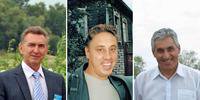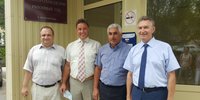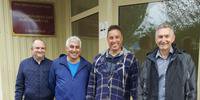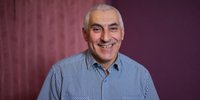The Case of Rogozin and Others in Volgograd
Filter
- #
Senior Investigator of the First Department for Investigation of Particularly Important Cases of the Investigative Department of the Investigative Committee for the Volgograd Region, Senior Lieutenant of Justice Ignatov, initiates a criminal case under the article on participation in a banned organization (Article 282.2 (2)). At that time, 48-year-old Vyacheslav Osipov, 71-year-old Valentina Makhmadagaeva and 65-year-old Olga Medvedeva and a number of "unidentified persons" became innocent victims of law enforcement officers. They are accused of holding video conferences, discussing biblical thoughts, and singing songs with fellow believers. According to the investigator, this is the resumption of the activities of Jehovah's Witnesses organizations.
- #
Several other believers are detained in Volgograd in the same criminal case: Valery Rogozin (born in 1962), Sergey Melnik (born in 1972), and Igor Egozaryan (born in 1965).
According to the investigation, they also repeatedly participated "in mass events for viewing, listening, discussing audio and video materials promoting the cult of religious superiority of the teachings of Jehovah's Witnesses."
- #
- #
- #
Sergey Melnik, Igor Yegoraryan and Valery Rogozin are officially charged under Part 2 of Article 282.2 of the Criminal Code of the Russian Federation.
- #
A. Ignatov, Senior Investigator of the Investigative Directorate of the Investigative Committee of the Russian Federation for the Volgograd Region, initiates a criminal case under Part 1 of Article 282.3 of the Criminal Code against Vyacheslav Osipov, Valery Rogozin and Denis Peresunko.
- #
Denis Peresunko is detained and interrogated as a suspect.
- #
The judge of the Central District Court of Volgograd chooses a measure of restraint for Denis Peresunko in the form of detention until October 13, 2019.
- #
Denis Peresunko is being prosecuted and interrogated as a defendant under Part 2 of Article 282.2 and Part 1 of Article 282.3 of the Criminal Code of the Russian Federation.
- #
The charges against Rogozin, Melnik, Egozaryan, Osipov have been toughened - now the investigation considers them to be the organizers of the extremist community. Volgograd residents face up to 10 years in prison.
Denis Peresunko is being interrogated as a defendant under Part 1 of Article 282.2 and Part 1 of Article 282.3 of the Criminal Code of the Russian Federation.
- #
Investigator Dudunkova terminates the criminal case against the elderly Olga Medvedeva and Valentina Makhmadagaeva for lack of corpus delicti. In this case, the investigator refers to the testimony of three witnesses.
- #
- #
Deputy Prosecutor of the Volgograd Region Ereshkin N.I. approves the indictment against Rogozin, Melnik, Yegozaryan, Osipov.
- #
The case goes to the Traktorozavodsky City Court of the city of Volgograd.
- #
Preliminary hearing on the case. About 30 people from the support group of believers in Volgograd come to court. Melnik, Rogozin and Egozaryan ask to be allowed to use the telephone and the Internet, as it is necessary for work, but the court refuses the petition.
At the same time, the judge allows Melnik to change his place of stay due to the fact that he needs to take care of a sick relative.
The judge of the Traktorozavodsky District Court of Volgograd changes the measure of restraint in the form of detention for Denis Peresunko to prohibit certain actions until March 23, 2020.
- #
In the Traktorozavodsky District Court of Volgograd, hearings on the merits begin. More than 40 people came to support the defendants, but the courtroom does not accommodate everyone. The bailiff asks those who did not have enough space to leave the hall.
The prosecutor reads out the charges, including singing religious songs and praying to "his God." "If I am accused of praying to God, then I do not understand what is extremist in this and what prayer has to do with banned organizations," Igor Egozaryan, one of the defendants, said in court.
The believers do not admit guilt and declare to the court that their faith is incompatible with extremism.
The prosecution witness says that she has attended meetings of Jehovah's Witnesses since the 2000s. She had no thoughts of overthrowing the constitutional order, and the information she heard at the meetings helped her cope with family difficulties.
- #
At the next court session, the believers' lawyers talk about numerous violations during the preliminary investigation. Witnesses for the prosecution, mostly elderly, say that their testimony was falsified.
The next court hearings in the Traktorozavodsky District Court of Volgograd are scheduled for February 21, 26 and 27, 2020.
- #
About 30 people gather near the building of the Traktorozavodsky District Court of Volgograd - relatives and co-religionists of the defendants came to support them. Not everyone gets into the courtroom.
Witnesses are being questioned at the hearing. These are mostly elderly people. They are outraged by the unjust persecution of Jehovah's Witnesses in Russia and say that their preliminary testimony contains words they did not say. One witness explicitly states that the investigator "composed and edited" her testimony.
The defendants draw attention to the fact that the prosecution specifically focuses on the questioning of elderly witnesses, since it is easier to confuse them and get the necessary testimony for the investigation.
- #
The state prosecutor asks the court to postpone the hearing, since for technical reasons it was not possible to deliver a classified prosecution witness. The judge agrees.
The next hearing is scheduled for February 27.
- #
A secret witness under the pseudonym Ivan is brought to the trial.
Lawyer Alexander Obukhov files a petition for the disclosure of the true data of the witness, referring to the practice of the European Court of Human Rights, in which the secrecy of a witness is an exceptional security measure permissible only in case of a serious threat to his life and health. The judge decides not to disclose the identity of the witness during the interrogation. The witness testifies from another room, being behind a thick curtain, answers questions via audio communication, changing his real voice, calls himself either feminine or masculine. The court prohibits asking questions concerning his identity. The interrogation lasts three hours. During the interrogation, the witness accuses the defendants of "spiritual terrorism." Counsel reminds that there is no such term.
The next hearing is scheduled for March 11, 2020.
- #
About 30 people come to support the defendants in the Traktorozavodsky District Court. Journalists are present at the trial.
The documents of the case, including the protocol of listening to the recording of the religious meeting, are being examined. The lyrics of several songs and prayers are also listened to.
The prosecution confuses the concepts of a religious assembly and a local religious organization (LRO). No one can be held criminally liable for participating in the meeting, the defense emphasizes. The position of the prosecution is at odds with that of the Russian Supreme Court, which did not ban faith, the defendants say.
- #
The court examines the record of the phonogram of the religious assembly. It reflects that believers discussed the topic of attitudes towards people, the Bible, raised questions about how a person's wealth affects the opinion about him. According to the defense, this does not confirm the version of the accusation of extremism in the actions of Volgograd Jehovah's Witnesses.
- #
At the hearing at about 4 o'clock, a secret witness under the pseudonym "Klentsov" is interrogated. (The participation of secret prosecution witnesses in the case significantly limits the believers' right to defend themselves.) When asked whether he had received threats from the defendants or from third parties, the witness gave a negative answer. This is puzzling as to why it was classified. He did not hear calls for violence and the overthrow of power from the defendants. Extremism, in his opinion, is disrespect for the state, but what exactly it is expressed, the witness does not explain.
- #
The hearing is being held behind closed doors due to the epidemiological situation. Only defendants and lawyers are allowed into the courtroom.
The court extends the measure of restraint for believers in the form of a ban on certain actions until September 9, 2020. The defendants file a motion to include in the case file the decision of the UN Working Group, which, in the opinion of the defenders, "should be directly applied in this criminal case and indicates the need for the immediate abolition of the measure of restraint and the cessation of criminal prosecution" against the Volgograd believers. The court retires to the deliberation room for 40 minutes, and then a break is announced.
- #
The Volgograd Regional Court rejects the believers' appeal against the ban on certain actions. Families of believers are experiencing serious financial difficulties due to the blocking of accounts and the inability to use the telephone and the Internet.
- #
About 10 people come to the courthouse, but no one is allowed inside due to the epidemiological situation.
The court interrogates a secret witness who kept a secret record of worship. He is in a separate room, his voice is changed. The witness claims that all the defendants are members of a local religious organization (LRO). But when asked whether he saw the names of the defendants in the list of members of the LRO, he replies that he does not remember. A secret witness considers it illegal activity of the defendants that they "obey God." When asked whether the Supreme Court banned the faith of Jehovah's Witnesses in the Russian Federation, he replies that no.
- #
The Traktorozavodsky City Court is interrogating FSB officer Vasily Gul, who claims that local believers were part of the Administrative Center and does not see the difference between legal entities and individual believers.
- #
The judge of the Traktorozavodsky District Court of Volgograd extends the measure of restraint in the form of prohibitions on certain actions against Valery Rogozin, Igor Yegozaryan, Sergey Melnik and Denis Peresunko, leaving them only bans on the use of communications and the Internet.
Judge Iryna Struk attaches to the case file the decision of the Committee of Ministers of the Council of Europe.
The court grants the prosecutor's request to extend the measure of restraint in the form of a ban on certain actions.
- #
At the request of the defense, three videos are watched at the hearing. The film about medicine examines the position of doctors and Jehovah's Witnesses regarding bloodless methods of treatment, which dispels the myth about the refusal of believers to medical intervention.
- #
The court rejects the defense's request to interrogate the religious scholar.
- #
The defendants are being interrogated. Valery Rogozin draws the court's attention to the discrepancy between the charges and the real actions of believers. Denis Peresunko talks about positive examples of Jehovah's Witnesses' behavior.
- #
Assistant prosecutor Anna Myagkova speaks in the debate with an accusatory speech. After a 1.5-hour break, the prosecutor requests sentences for Jehovah's Witnesses in Russia: Denis Peresunko and Valery Rogozin - 9 years in a general regime colony, and Igor Egozaryan and Sergey Melnik - 7 years in a general regime colony.
- #
- #
During the hearing, the court makes a decision on the production of additional expertise in the case. In this regard, the hearings are postponed indefinitely.
- #
The court resumes hearings at the stage of argument of the parties. The first of the defendants is Denis Peresunko. He says that he values the Bible and considers it necessary to introduce this book to others, emphasizing that the religion of Jehovah's Witnesses was not banned by the decision of the Supreme Court. Peresunko also notes that he has never refused high-quality and safe medical treatment.
At the next session, Sergey Melnik and Igor Yegorzaryan are scheduled to speak in the debate.
- #
27 people come to the meeting.
During the debate, Sergei Melnyk rejected the accusations of extremism, drawing the court's attention to the fact that the prosecutor's office did not provide any solid evidence of the believers' guilt.
Igor Egozaryan reminds the court that Christians have been persecuted before, and cites the example of the persecution of Jehovah's Witnesses in Germany and the USSR. He also states that during the hearings, secret prosecution witnesses gave false testimony against the defendants.
- #
Valery Rogozin takes the floor in the debate. He states: "In order to sentence me to 9 years in prison, the prosecutor's office must have very good reasons that have not been presented." He further refutes all counts of the indictment.
Responding to the charge of organizing the activities of an extremist community, Rogozin explains that the term "elder" is not a legal, but a canonical concept.
Valery also provides evidence that the secret witness gave false testimony.
Rogozin draws attention to the fact that the criminal prosecution of believers in Russia grossly violates the Constitution, and connivance on the part of the authorities leads to the fact that Russia does not fulfill its international obligations, in particular, relating to the observance of human rights.
- #
The debate of the parties continues. The believers' lawyers draw the court's attention to the fact that their clients did not commit actions that fit the definition of extremism, and also remind that the decision of the Supreme Court of the Russian Federation of April 20, 2017 does not prohibit Jehovah's Witnesses from continuing to practice their faith.
- #
The defendants make their final statements. The meeting is held behind closed doors, even the wives of believers are not allowed to attend the hearing.
In his last word, Sergey Melnyk emphasizes: "I do not consider myself guilty, because I have never done anything that goes against the laws of God. Moreover, I tried to do good, to show love and justice, to take care of people."
Igor Egozaryan notes: "My accusers, with some unhealthy stubbornness, are trying to convince everyone that the peaceful practice of a religion that is not banned in the Russian Federation is actually extremism."
Denis Peresunko explains that he is being judged only because he and his friends reflected on the beautiful truths from the Bible: "Your honor, Jesus was tried and killed for bringing truth to people. I am being judged because I learned the truth that is in the Bible and discussed it with my friends."
Valery Rogozin says in his last speech: "I am sure that you have never seen such "extremists" before - calm, neat, polite, positive-minded. I would call the accusation of an extremist crime against me a great desire to wishful thinking no matter what."
The last word of the defendant Denis Peresunko in Volgograd The last word of the defendant Igor Yegorzaryan in Volgograd The last word of the defendant Sergey Melnik in Volgograd The last word of the defendant Valery Rogozin in Volgograd - #
The announcement of the verdict is postponed to September 23.
- #
Judge of the Traktorozavodsky City Court Irina Struk sentences Valery Rogozin to 6 years and 5 months in a penal colony, Denis Peresunko to 6 years and 3 months in a penal colony, Sergei Melnik to 6 years in a penal colony and Igor Yegorzaryan to 6 years in a penal colony.
- #
It becomes known that Igor Egozaryan, Denis Peresunko and Valery Rogozin will wait for an appeal in colony No. 9, located on Kostyuchenko Street in Volgograd.
- #
It turns out that Sergey Melnik is in pre-trial detention center No. 3 in the city of Frolovo, which is 145 km from the previous place of detention (SIZO-1 in Volgograd).
- #
The lawyer visits Igor Yegozaryan, Denis Peresunko and Valery Rogozin in Volgograd. They are held in a small detention facility attached to a maximum security penal colony. The territory is kept clean and tidy, but due to the fact that the building is old, the cells in it are cold and damp. This affects the well-being of believers: they have all been ill. Valery Rogozin says: "I was seized by sciatica, so I could not straighten up for several days. In writing, I went to the doctor for help, painkillers and ointment received only 4 days later. Igor Egozaryan says: "The showers are old, without ventilation, it is impossible to breathe - I almost lost consciousness. I had to ask to leave early."
Although each of the believers upon arrival had with them a Bible from the previous pre-trial detention center with the marks of the censors, the management sent the books for a lengthy re-check. Believers have not yet received letters. The head of the detention center explains this by the fact that the pre-trial detention center does not have its own censor, which is why all letters are sent to another institution for verification.
In general, believers feel well, but they are worried about their relatives. Igor Yegozaryan is especially worried about his 83-year-old mother, who finds it difficult to endure the criminal prosecution of her son.
- #
The lawyer visits Sergey Melnik in pre-trial detention center No. 3 in the town of Frolovo. The believer says: "The conditions of detention are normal, a little cool, the food is tolerable." There are 4 people in the cell with him. At the new place, Sergey has already received one letter from his wife.
On the same day, Rogozin, Yegoraryan and Peresunko were transferred to the Frolov pre-trial detention center.
- #
The lawyer visits Valery Rogozin, Igor Yegozaryan, Denis Peresunko and Sergey Melnik in the pre-trial detention center.
All prisoners are in a good mood, although they miss their loved ones. Sergei Melnyk notes: "I have everything here, except freedom, of course. I miss my family, my wife Anyutka."
Igor Egozaryan is worried about his son and elderly mother, who was left without his support.
Valery Rogozin was initially held in a smoking cell, but later he was transferred to another cell, and later another prisoner who quit smoking. Valeriy received more than a thousand letters of support from different countries.
Denis Peresunko is very grateful for the letters of support. He especially likes letters with pictures and diagrams. His cellmates are impressed by the fact that letters come to him from all over the world, even from Australia and Scotland.
All four had a good, respectful relationship with their cellmates. Everyone has the opportunity to read the Bible. Believers have no complaints about their health, medicines are given out on time. In general, the conditions of detention in the pre-trial detention center are normal, there is everything you need.
- #
The panel of judges of the Volgograd Regional Court, chaired by Igor Tkachenko, dismisses the appeal of Valery Rogozin, Igor Yegozaryan, Denis Peresunko and Sergey Melnik. The verdict comes into force.
- #
It becomes known that three of the convicts were taken to a colony 1200 km from home. Igor Egozaryan, Denis Peresunko and Valery Rogozin will serve their sentences in Udmurtia. They can receive letters of support.
Sergey Melnik is still in pre-trial detention center No. 3 in the city of Frolovo, Volgograd Region.
- #
The lawyer visits Denis Peresunko, Igor Yegorzaryan and Valery Rogozin in the penal colony. In the barracks where they are kept, it is warm, there is an opportunity to visit the bathhouse twice a week. Valery and Denis work in the sewing industry - they make tubing. The working day lasts from 9:00 to 16:00 with a lunch break. The believers have normal relations with the administration and prisoners. They are treated with respect.
The men report that when they were sent to the colony, personal copies of the Bible were taken from them and promised to return them after the clergyman put seals on them. In the library, believers were given Bibles in the Synodal translation.
Denis Peresunko feels fine. He receives his medications on time. A disability pension comes to his account. Part of the amount, according to Denis, is withheld for clothes, underwear, hot water. In production, he sews handles for tubing, often exceeding the norm. The believer says that in his free time he likes to observe nature, especially birds.
Igor Yegozaryan says that he has no health problems. In the Izhevsk pre-trial detention center, he managed to get to the dentist. The believer received the 2nd category in sewing, and now he is undergoing 4-month training as a stoker.
Denis, Igor and Valery are grateful for the letters from fellow believers that they receive from different countries. They are issued every other day for 15-20 pieces.
- #
It becomes known that Sergey Melnik is in SIZO-1 in Perm and is waiting to be sent to Kirov. During the transfer process, according to Sergey, the cells were warm. In total, the journey to the colony will be more than 2,200 km.
- #
It becomes known that Sergei Melnik arrived at correctional colony No. 5 in the city of Kirovo-Chepetsk to serve his sentence. He can write letters.
- #
Igor Egozaryan, Valery Rogozin and Denis Peresunko do not lose their positive attitude, they do not complain about their health. They receive regular letters of support. All three work in the sewing shop.
- #
Sergey Melnik works in the dining room from 5:30 to 18:00 according to the 2/2 schedule. He says that the conditions of detention are normal, physically healthy, relations with everyone are good. Letters from fellow believers are received in electronic form. Sergei says that the censor crosses out the name of God in them.
- #
Valery Rogozin, Denis Peresunko and Igor Egozaryan continue to receive letters of support from relatives, friends and fellow believers. All three can read the Bible and talk to their relatives.
Denis Peresunko's health problems have worsened in the colony. He is a group III disabled person and suffers from several chronic diseases. Recently, he was transferred to another barracks, where he felt better.
- #
Sergei Melnik lives in a barracks with 100 beds, where 80 prisoners are held, with whom he has a calm relationship. Sergey can communicate with his wife by phone. He has a Bible, and he still receives letters.
- #
Valery Rogozin, Denis Peresunko and Igor Egozaryan feel fine. They continue to work in the sewing industry, and Igor learned to be a stoker and worked for some time in a boiler room, where they noted his conscientious attitude to work.
About 70 people live in the barracks in which believers are kept, they have shared TVs and refrigerators. Valeriy, Denis and Igor have the opportunity to buy additional food and medicines at a local stall, relatives and friends give them vitamins.
All three continue to receive letters that serve as a great support for them. Due to their busy schedules, they do not have time to answer each of them. Denis looks at the colorful drawings that are sent to him with special warmth.
Believers experience some difficulties in receiving registered letters, while simple letters reach them without problems.
- #
Serhiy Melnyk still works as a cook and also serves as a food dispenser in the dining room. Although he acquired this profession in the colony, he now feels confident in it. Sergey is very tired physically, as he has to spend many hours on his feet.
About 30 people are kept in the barracks together with Melnik. The believer receives letters, but mostly by e-mail; Paper ones arrive with a delay or do not arrive at all.
In the near future, Sergey should have a long meeting with his wife, who will come to him from Volgograd.
- #
Letters to Sergey Melnik are received only by registered mail or through the zonatelecom system.
- #
Valery Rogozin and Denis Peresunko have twice received the award at the production site as an encouragement. Peresunko began to drink more water and reduced salt intake, so he feels better. Igor Yegorzaryan often has a headache. A local doctor suggested he have an MRI.
All believers have their own copy of the Bible. There is no hot water in the barracks where they are kept, but the opportunity to take showers at work helps men.
- #
Igor Egozaryan, Valery Rogozin and Denis Peresunko are in penal colony No. 5 in the Udmurt Republic.
- #
After the transfer of Rogozin, Egozaryan and Peresunko to the colony in Sarapul, many personal belongings were taken from them, which were allowed to be used in the previous colony. At the same time, Denis Peresunko was given the necessary inhalers, and Valery Rogozin was given his blood pressure monitor.
The food in this colony, according to believers, is more varied, and prisoners do not smoke in the barracks, only in specially designated places. Bibles were confiscated from believers. Igor Yegozaryan's copy was taken away despite the fact that it bears the seals of the penal colony and the Sarapul diocese.
At the new place, all three have worked for only one day so far: Valery and Denis are again in the tubing shop, and Igor is in the metalworking shop.
- #
Denis Peresunko is in a good emotional state and regularly receives letters of support. Thanks to his exemplary behavior, he manages to maintain respectful relations with the administration of the colony and other prisoners. Denis has unstable blood pressure and also needs the help of a dentist.
- #
Sergey Melnik continues to work in the canteen and lives with other employees. He has access to hot water. The physical condition of the believer stabilized. When he had back problems, he had to undergo medication.
- #
The attitude of the administration and other prisoners towards Sergei Melnik is good. With some of the squad, he cooks food together, shares recipes for unusual salads. Sergey has already received more than 5 thousand letters, he receives about 60 pieces a month. He tries to answer each one.
- #
Rogozin, Egozaryan and Peresunko regularly receive letters and parcels. All three have a Bible. They have the opportunity to call loved ones and shop in the store.
Valeriy and Igor work in the sewing workshop, and Denis is kept in a unit for the disabled and those who do not work. In August, he was sent to the hospital at penal colony no. 8 for Udmurtia due to problems with his spine.
- #
- #








